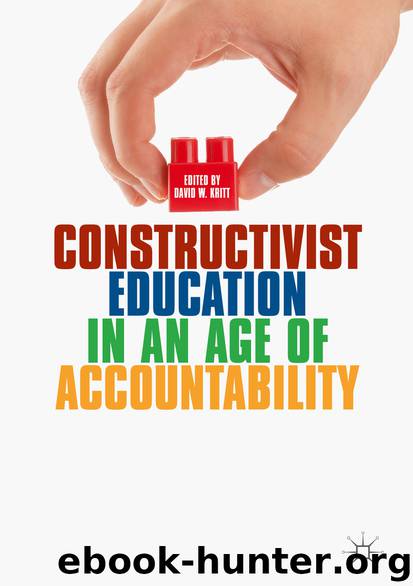Constructivist Education in an Age of Accountability by David W. Kritt

Author:David W. Kritt
Language: eng
Format: epub
Publisher: Springer International Publishing, Cham
Commercial Games Appropriated for Learning
Given the popularity of the topic of games in education and the limited availability of robust educational games to support curricular imperatives, it’s not surprising to find enterprising educators looking to existing commercial game worlds to repurpose them for the classroom. This, of course, shifts the burden of educational development onto the teacher, though in every instance described below, teacher collectives have cohered online to collaborate, problem-solve, and share focused activities for students. In comparing so-called serious games and entertainment games, Gee finds little diff erence at the design level, with one critical distinction: serious games demand the player demonstrate explicit knowledge, that is, show learning, while games for entertainment make no such demand on the player, relying instead on the built-in need for the player to carry learning forward to new game conte xts, tasks, or engagements (Gee, 2008). This does not mean important learning experiences aren’t or can’t happen in entertainment games. It means that aspect has to occur outside the game space (e.g., in a classroom).
In the desirable category of virtual worlds, there are two kinds of pla y worlds. One is simply a sandbox space with no inherent purpose, but a lot of possibilities for driving activity, for instance, constructing buildings, making tools, cultivating, and shaping the landscape. In these multiplayer spaces, players set their own goals and roles. These landscapes do not rely on a narrative and there is no call to action beyond what the players decide they are doing. Such a space is not a game space per se, although of course players are free to assign goals and create or reframe aspects of the world as problems to be solved. A second kind of virtual world is explicitly a game, with narrative that describes the values and direction of actions in the game, with goals and quests for players to accomplish, ‘win’ conditions, and an end state. Typically, such worlds have limits on player construction, but actions players take in pursuit of game quests or in solving game problems have an impact on the world they see.
Both kinds of virtual worlds exist as commercially available software. As such, they typically offer high-quality graphics and interface, and support sophisticated player actions. Commercially successful multiplayer virtual world games, such as World of Warcraft (WOW), Minecraft, Elder Scrolls, and Star Wars: The Old Republic, have pushed gaming into family living rooms and out of the basement, in part, because the rich narrative, diver sity of player roles, range of actions, and sheer scope of landscapes offer something for almost everyone. Additionally, as massively multiplayer game spaces, these game worlds support social inter action that can be casual chatter, role-playing dialog ue, and strategic engagement to tackle a problem. Successful commercial games must teach their players how to pla y in order for the game to keep its player base and its revenue. It’s not surprising then to see how remarkably good they are at onboarding and supporting new players, encouraging and sustaining a sense of player comm unity.
Download
This site does not store any files on its server. We only index and link to content provided by other sites. Please contact the content providers to delete copyright contents if any and email us, we'll remove relevant links or contents immediately.
| Administration | Assessment |
| Educational Psychology | Experimental Methods |
| History | Language Experience Approach |
| Philosophy & Social Aspects | Reform & Policy |
| Research |
The Art of Coaching Workbook by Elena Aguilar(51198)
Trainspotting by Irvine Welsh(21663)
Twilight of the Idols With the Antichrist and Ecce Homo by Friedrich Nietzsche(18632)
Fangirl by Rainbow Rowell(9249)
Periodization Training for Sports by Tudor Bompa(8271)
Change Your Questions, Change Your Life by Marilee Adams(7780)
This Is How You Lose Her by Junot Diaz(6885)
Asking the Right Questions: A Guide to Critical Thinking by M. Neil Browne & Stuart M. Keeley(5772)
Grit by Angela Duckworth(5614)
Red Sparrow by Jason Matthews(5471)
Paper Towns by Green John(5188)
Room 212 by Kate Stewart(5119)
Ken Follett - World without end by Ken Follett(4731)
Housekeeping by Marilynne Robinson(4445)
The Sports Rules Book by Human Kinetics(4385)
Papillon (English) by Henri Charrière(4274)
Double Down (Diary of a Wimpy Kid Book 11) by Jeff Kinney(4268)
The Motorcycle Diaries by Ernesto Che Guevara(4098)
Exercise Technique Manual for Resistance Training by National Strength & Conditioning Association(4071)
